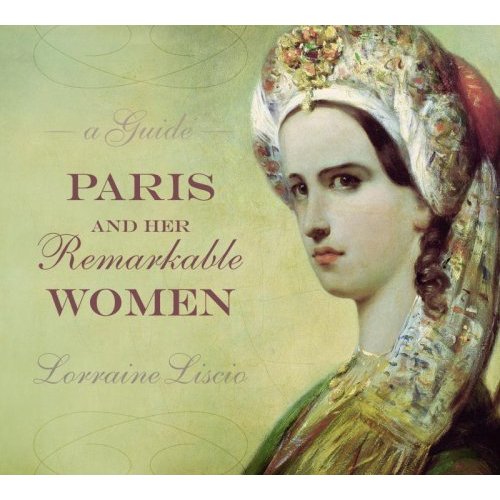
Lorraine Liscio is a writer and editor who holds an MA in French and a PhD in English. For years she served as the Director of Women’s Studies at Boston College, where she also taught literature. She currently lives in New Hampshire, but spends several weeks a year in Paris. The following article, written by Sion Dayson, covers a speaking event held on January 21, 2010 where Liscio discussed her new book.
At a recent event at Paris’ Village Voice Bookshop, an audience member asked author Lorraine Liscio to give her personal definition of feminism.
“There is no one definition,” she responded.
Not to be deterred, the questioner persisted – but what was her definition? Liscio answered that feminism was “anything that improves the visibility of women.”
The former Director of Women’s Studies at Boston College, Liscio’s recent book raises the visibility of sixteen incredible women whose stories are inextricably tied with the City of Light.
“Paris and Her Remarkable Women” profiles such well-known figures as Marie Curie, as well as less familiar names, like Christine de Pisan, just one of two women Liscio names as feminists in her book (the other being Simone de Beauvoir).
That distinction gets to the heart of what feminism must mean to Liscio. De Beauvoir “started the women’s movement” and de Pisan “wanted the improvement of women’s lives,” she explained. All of the subjects in Liscio’s book are strong women, but that does not automatically make them feminists. Only de Beavoir and de Pisan actively worked to advance the standing of women as a defining mission in their life.
Indeed the word ‘feminism’ did not exist during the time of most of these women. The earliest woman profiled – Geneviève, Paris’ patron saint – lived during the fifth century.
“She did exist,” the author laughed, pointing out that with the amount of mythology surrounding Geneviève, she hadn’t been sure at the start of her research whether the patron saint was actually real.
The book illuminates not only the lives and accomplishments of these women, but also the City of Light. Liscio brings alive the Paris of each time period, and lists sites that are associated with each woman after her profile. Most of these sites are located in well-touristed areas of Paris, yet these women’s connections to these places are perhaps not known at all. Their most important contributions have often served merely as sidenotes.
How come Emilie du Châtelet, for example, is always referred to as “Voltaire’s mistress,” and never as the brilliant physicist that she was? Or that some of the ideas for Rodin’s famous sculptures might actually have come from his lover Camille Claudel? (Claudel was a gifted sculptor at a time when women were not allowed admission to study the craft in school. She ended her life in an insane asylum, some claim, because she believed Rodin had stolen her ideas and the thought drove her mad.)
Prompted by an audience member who lived on a street named after Madame de Sévigné but didn’t know who she was, Liscio read a delightful epistle penned by de Sévigné, who made letter-writing into an art. Though Liscio said it felt awkward to read the letters in English given where she was – the originals were written in French, and here we were in France – her translations were wonderful, the full wit shining through.
“It’s a great shame that only English-speakers will know the history of our Parisian women,” remarked one Frenchman, when Liscio said the book wasn’t yet available in French.
And of course, that is the point of this book: to reclaim these women’s histories, bring forth their stunning tales. Why don’t the French know them already? Why don’t we?
“I can’t imagine why I wouldn’t have written this book,” Liscio said. She was inspired by everything. For those already captivated by Paris, these women’s stories add an amazing dimension to the City of Light. For those who don’t know either, there’s a good chance they’ll fall in love with both.
Sion Dayson is a writer living in Paris, France. She holds a degree in sociology and anthropology. Her work has appeared in such venues as Youth Activism: An International Encyclopedia, the Chapel Hill News, the Village Voice, and EcoHearth.com. She has also won honorable mentions for her fiction (University of Maine and University of New Orleans writing contests) and been published in a National Book Foundation anthology. In 2007 she won the Barbara Deming/Money for Women Fund award for her fiction. Her blog, paris (im)perfect, captures the quirkier side of the City of Light.

Isn’t it facinating when you find out the truth behind popular history. I think that this sounds like a great book! Amazing that it is only available in English, I have french friends who I’m sure would be interested.
yours
Lydia Martindale